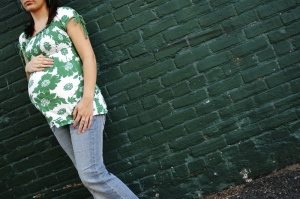Research Shows Teen Moms Abused as Children at Risk to Repeat Cycle
November 12, 2013 / by Emily Alpert Reyes- Giving
- Research
Eighteen and pregnant, Jessica Chandler was terrified. Taken away from her mentally ill mother and placed into the foster care system as a child, she wanted to be a good parent.
"But I didn't really know what that meant," said Chandler, now a graduate student at Cal State Northridge.
Although she got help from programs that taught her about child rearing, two of her sisters were less fortunate. They struggled with parenting and lost their children to the same system that once claimed them.
A new report by USC and UC Berkeley researchers confirms what social workers have long suspected: that teen mothers who suffered mistreatment as children risk repeating the cycle with their own children.
In Los Angeles County, more than 40% of teen mothers had previously been reported to Child Protective Services as possible victims of childhood mistreatment; nearly 20% were confirmed to have suffered such abuse or neglect, the researchers found.
Their children, in turn, were twice as likely to suffer such mistreatment as children of other teen mothers.
By their fifth birthday, more than 34% of children born to teen mothers reported or confirmed as victims of childhood mistreatment were also reported as possible victims of neglect or abuse.
Scholars have long associated teen motherhood and childhood abuse, but the report provides specific numbers by linking abuse complaint data and teen birth records.
The findings also bolster long-standing ideas about a cycle of abuse from one generation to the next, a widely believed theory that had lacked strong evidence to back it up.
"We talk about wanting to break the cycle of maltreatment. There seems to be an opportunity here," said Emily Putnam-Hornstein, assistant professor in the USC School of Social Work and principal investigator of the research.
By zeroing in on teen mothers who have been victimized, programs might be able to halt or avert another generation from suffering the same kinds of abuse, she said.
The study also focused on L.A. County teens who ended up in foster care: More than a quarter of girls in foster care at age 17 became mothers in their teens, researchers found.
"The sad part is they really don't understand the concept of being a mother yet," said Ebony Randolph, a former foster youth now studying social work at USC.
Advocates said the study, funded by the Conrad N. Hilton Foundation, should rally policymakers to ensure that vulnerable youth are taught about pregnancy prevention and to marshal more resources for foster teens who become parents.
"These young parents do not have parents to turn to to help them," said Amy Lemley, policy director for the San Francisco-based John Burton Foundation for Children Without Homes. "We simply can't look away and pretend we don't know what happens to their children."
This article originally appeared in the Los Angeles Times.
To reference the work of our faculty online, we ask that you directly quote their work where possible and attribute it to "FACULTY NAME, a professor in the USC Suzanne Dworak-Peck School of Social Work” (LINK: https://dworakpeck.usc.edu)
